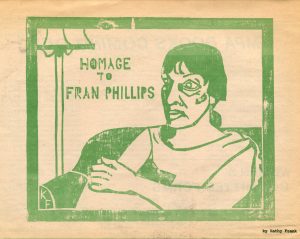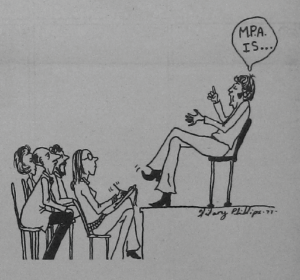Fran Phillips

Frances (Fran) Phillips was one of many early MPA members who were not ex-patients, but aligned themselves with the political goals of the MPA as allies supporting the cause and contributing to the work. Coming to the organization very early in its existence, Fran found community and employment at the MPA and became a colleague, friend and mentor to Dave Beamish and a strong supporter in propagating MPA’s self-help model. She had been a public health nurse, and the period before joining MPA Fran worked as a supervisor on a research project to provide psychiatric care for people in the Vancouver community.
By 1972 Fran had become a keen MPA member, a regular attendee at meetings, and frequent contributor to the Nutshell. She soon took on a paid position, successfully running for election in 1973 as the residence coordinator in one of the MPA houses. “Phillips was given the job not because she was a nurse,” Jackie Hooper noted, “but because she was an MPA member.” The MPA founders told us that Fran needed regular paid work because she supported her husband and several children.

Homage to Fran Phillips,” by Kathy Frank, lithograph, In A Nutshell, 1978.
MPA members remember Phillips as a resourceful and supportive member. Artist Kathy Portland Frank carved a lithograph of Phillips in her honour, entitled “Homage to Fran Phillips.”
Fran’s membership in the MPA probably allowed her to reshape her identity as a mental health worker, bringing together personal need, professional skill and political commitment. These elements made Fran a valued and committed MPA member, and for almost a decade she worked as a residence coordinator at MPA. Although Fran was not regarded as one of MPA’s high profile feminists, she was evidently connected to and personally close to a number of women in the organization including Patty Gazzola (nee Servant).
It is an interesting phenomenon to have a mental health practitioner move from a professional position to work in a radical grassroots organization. Fran appears to have been attracted to the radical philosophy of participatory democracy that shaped the organization of the MPA and the opportunity of working side-by-side with ex-patients – both elements that were very much in the egalitarian spirit of the era. Her In A Nutshell articles demonstrate that Fran’s views aligned well with the radical political mentality many MPA members held.
 Fran was well aware of the way the institution could constrain patient initiative. She was a strong proponent of deinstitutionalization, the community mental health project, and the potential for self-empowerment offered by the MPA model. In a 1973 Nutshell article, Fran reported on the progress made by members living in the MPA homes. Quite outspoken, she reminded residents to live up to the principles of self-help in the MPA house. This meant, Fran noted, showing initiative and taking responsibility, for example in cleaning up dirty dishes and sharing in the household tasks.
Fran was well aware of the way the institution could constrain patient initiative. She was a strong proponent of deinstitutionalization, the community mental health project, and the potential for self-empowerment offered by the MPA model. In a 1973 Nutshell article, Fran reported on the progress made by members living in the MPA homes. Quite outspoken, she reminded residents to live up to the principles of self-help in the MPA house. This meant, Fran noted, showing initiative and taking responsibility, for example in cleaning up dirty dishes and sharing in the household tasks.

Dave Beamish recalled in his interview that he and Fran were able to take on regular paid speaking engagements at local secondary schools and universities because Fran had the required professional credentials. The pages of The Nutshell tell us that Fran did a great deal of this work in the late 1970s, always appearing alongside former patients and talking to college and university classes and public groups about the work of MPA.
In March 1976, Jackie Hooper travelled with Fran and members of the Vancouver Women’s Health Collective to Banff, Alberta for a national conference on behaviour modification, meeting mental health professionals from across Canada and the United States and selling the merits of the MPA, “brand of participatory democracy and self-help” as a form of positive decision-making and personal change.
Interestingly, it was her friendship with Dave Beamish that eventually led Fran to take on a new role as the director and residential coordinator of the Pioneer House project in New Westminster in the early 1980s. By then, Dave was the ex-patient representative on the board of the Riverview Hospital Volunteer Association (RHVA), a newly formed volunteer organization out of Riverview Hospital whose aim was to create community housing for discharged patients. Dave brought in his former MPA mentor and friend to co-lead RHVA’s first housing project. Fran’s registered nurse (RN) credentials, Beamish recalled in an interview, allowed RHVA to establish the facility as a licensed care home under the Community Care Facilities Act. As can be imagined, the two MPA founders energetically promoted and applied the shared MPA values and principles in the new home, continuing to assert their political voice and influence as mental health advocates.
We could not interview Fran for the MPA history project because she died in the 1990s. Many MPA interviewees, however, highlighted the important role Fran played in the early days of the organization. We are interested in locating further biographical information about Fran.
